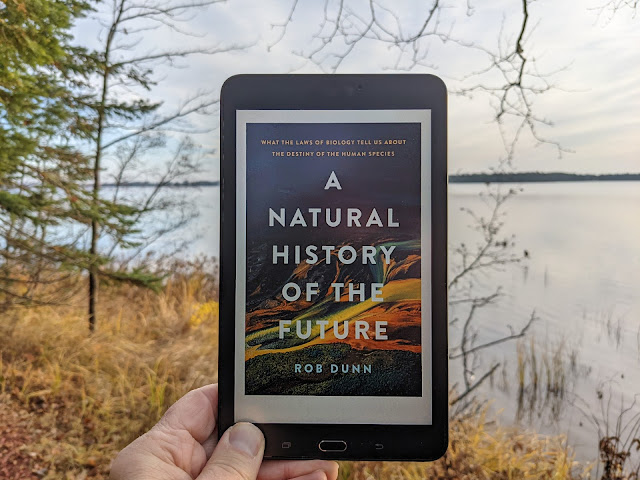A Natural History of the Future by Rob Dunn
Humanity's impact on the environment around us is easy to see. We have dammed and re-routed rivers, built large cities whose growth has sprawled and interconnected, constructed nationwide and international transportation networks, and much more. All of these things have transformed the natural world.
But along with many of our environmental "improvements" have often come unintended consequences. Climate change is probably humanity's largest unintended environmental impact - indeed it may prove to be our most impactful change, and one that is already giving evidence to how detrimental it can be to humanity itself.
Rob Dunn's A Natural History of the Future gives us plenty of food for thought as we contemplate a warmer future. That said, this is not a book about how to prevent global warming. It doesn't lay out policy prescriptions for mitigating climate impact, ala Bill Gates' How to Avoid a Climate Disaster. Rather it's a book urging us all to think about humanity's place in the natural world, to rethink what we do and the impact it has on the planet's inhabitants in total - human, plant, animal, or microscopic.
The book is full of examples of unintended consequences. Trying to contain the Mississippi River behind levees to clear land for occupation has led to larger and more damaging flooding when those levees inevitably burst. Creating large cities and connecting them with interstate highways has led to environmental conditions favoring certain animals - urban rats and pigeons for example - over others. Creating Cape Canaveral led to the extinction of the Dusky Seaside Sparrow. Favoring birth by C-section has led to babies who lack the appropriate gut microbiome normally acquired from their mothers during vaginal births. Babies born via C-section can be more susceptible to asthma, celiac disease, obesity and Type 1 diabetes.
The book is also full of examples of how much we know about life and the species that surround us, but more importantly, how much we DON'T know. We know that if you were able to put all the life on Earth on a gigantic scale, the weight of humanity would be a very small percentage of the total - most life on earth is microbial. Yet our understanding of microbial life is only just beginning. We can list a number of species that have gone extinct, but we know that species form dependencies with other species (think of humans and their dogs, or cows, or even more directly humans and their malaria viruses or humans and their pinworms). So any count we have on extinct species is necessarily low as we haven't made attempts to understand the co-extinctions that went along with them.
We also know that all species eventually go extinct - one of the many biological laws that Dunn cites throughout the book. As he puts it: "We [humanity] are a clumsy giant late to the drama, a character in life's play that doesn't make it to the curtain call." In other words, no matter what we do - however we handle the looming climate crisis - at some point in the future humanity will face extinction, and life on Earth will go on without us. The ultimate message of the book is that we should be humble and open to learning more, so that we can begin to live within nature's laws, using them to our benefit rather than continuing to try to "tame" nature and facing the growing unintended and adverse consequences.
Four Stars ⭐⭐⭐⭐ for A Natural History of the Future.
NOTE: I received an advanced reviewer's copy of this book through NetGalley and Basic Books in exchange for a fair and honest review. The book is generally available Tuesday, November 9, 2021.
A Natural History of the Future links:
📙 Borrow this book: Find out if your library has the ebook or audiobook available.
📘 Buy this book: Amazon | Barnes & Noble | Books-A-Million | AbeBooks | Powells | ThriftBooks
📗 Support Indie Bookstores: Buy this book directly from Bookshop.org or find an Independent Bookstore near you.
